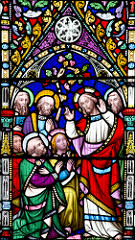
The most solid argument I have read about what the word in Luke 1:2 translated as “eyewitnesses” actually means is by John N. Collins: see the post What Did Luke’s Eyewitnesses See? Collins presents a cogent argument that the word really means officials who have the responsibility for the writings/library of the community: it is their job to assess and preserve the authenticity of the documents entrusted to them — they are “specially authorized guarantors of the traditions.”
But in this post I am backtracking and working from the assumption that the word does convey the idea of one who sees firsthand some event. What I am saying here is this: What if the word really did express the idea of a witness? What does such a witness mean for Luke?
Norman Perrin answered this question nearly forty years ago in Rediscovering the Teaching of Jesus.
Firstly, Perrin begins by reminding modern readers that they must leave behind their modern conceptions and make an effort to enter the world of the biblical authors. Get out of your heads any modern notion of what the word “eyewitness” means to us today who are familiar with the concept from our newspaper reports and court proceedings:
If we resolutely ban from our minds . . . what a modern writer would mean by an ‘eyewitness’ and ask ourselves what Luke meant by the expression . . . . (p. 27)
Perrin’s conclusion?
Luke considers Paul an eyewitness!
Perrin explains: Continue reading “What Luke’s witnesses saw — according to Luke”
